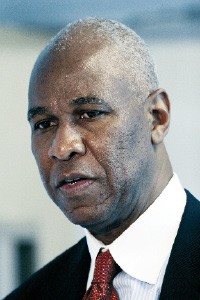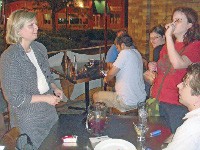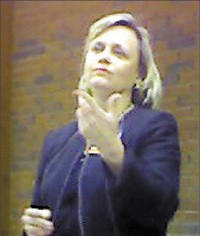We have seen the field. That is the hard, inescapable fact of last week’s filing deadline. The next mayor of Memphis will almost certainly be one of three contenders — two of whom are familiar properties: the proud (some say reckless, some say haughty) incumbent Willie Herenton, and the determinedly independent (some say foolishly stubborn) City Council member Carol Chumney. A third candidate, former NAACP official and MLGW head Herman Morris, has yet to make his profile clear, and that is perhaps his major problem.
Oh, there is yet a fourth candidate, former Shelby County Commissioner John Willingham, who is well enough known. Respected, even beloved, by some for his densely detailed plans to fix virtually everything and regarded as an eccentric by a perhaps greater number, Willingham constitutes a relatively distant second tier all by himself.
And after him, among the 12 other candidates who qualified by the July 19th filing deadline, there is naught but anonymity, lacking as of now even Robert “Prince Mongo” Hodges, the barefoot denizen of the Planet Zambodia and the numbing punchline to an old joke which, for some time now, has been told only by himself to himself.
A perennial, Mongo filed his papers correctly but was disqualified for one more run because of unpaid fines relating to state election requirements. The now officially irrelevant Mongo did have one moment of historical importance, shaking loose a few hundred frivolous protest votes that likely would otherwise have gone to then-incumbent mayor Dick Hackett in 1991 and thereby making possible the victory, by a margin of 142 votes, of former Memphis City Schools schools superintendent Herenton as the city’s first elected black mayor.
If not for that, Mongo would have been no more consequential than a candidate who remains on the ballot — Bill (formerly Willie) Jacox, the perennial’s perennial, who disappeared from Shelby County ballots for a decade, as did his crude self-advertising handbills that used to litter telephone poles throughout the city, but who is back this year. Two other candidates — bus driver Carlos Boyland and businessman Randy Cagle — were so obscure that, when they tried to launch early candidacies at the Election Commission’s downtown office in 1996, they were erroneously given petitions to run for county mayor that year.
Cagle made something of a fuss at a recent neighborhood forum in southeast Memphis when he accused the media of downplaying his prospects and keeping him, and others like him, out of the charmed ranks of acknowledged contenders.
It doesn’t work like that, of course. Though here and there over the years an effort has been made to logroll somebody into or out of prominence, the media don’t make or break anybody. They — we — are still merely chroniclers of moods and momentums that stir of themselves, or, as in the case of Shelby County mayor A C Wharton, the reluctant warrior who last week finally and firmly squelched insistent draft efforts by a multitude of well-known and unknown courtiers desperate for a change at the city’s helm, are put into motion by specific forces in the community itself.
Now, as always before and (one hopes) forever, ours is a representative system. That, for better and for worse, is the root fact.
Who, then, do the major players represent? Here is a capsule of sorts:
Mayor Willie Herenton: By his own testimony, the incumbent mayor is still the man who, as he told an almost hysterically happy, cheering crowd of mainly African-American citizens at The Peabody on an October night in 1991, was “willed” by them into power and prominence as the culmination of historical justice and inevitability, whose accession to power was attended, at the last rally and at the first post-victory celebration, by no less a figure than Jesse Jackson, the civil rights avatar who had been on the balcony of the Lorraine Motel in 1968 with the slain martyr Dr. Martin Luther King Jr.
One of the ironies of this mayor’s career is that he could not have represented outcasts from power and passions so long denied had he not, just prior to his ascension, been suddenly cast into disrepute with a civic establishment that had once embraced him and appointed him to its major power boards. Forced from his perch as head of the Memphis schools system by a sexual scandal (the late 1980s were post-Gary Hart and pre-Clinton times) and by alleged administrative irregularities, Herenton became a martyr for that moment of change.
 Justin Fox Burks
Justin Fox Burks
The mayor, an able and commanding figure and (as he never tired of reminding people) a once-undefeated Golden Gloves champion, won three subsequent elections on the strength of his personal dominance and visible successes — mainly in civic (read: downtown) reconstruction and a record of (apparent) fiscal solvency. But his fourth term, which began with a thunderous denunciation of his City Council and a heady claim of divine sponsorship, proceeded into financial difficulties, an era of resurgent crime, and all-too-mortal wrangles with disbelievers, who included both council members and those members of a disaffected population who were challenged by Herenton to “leave” if they didn’t like how he did things in his dominion.
As it happens, the number so aggrieved has risen to the point, among blacks as well as among whites, that the mayor actually ran second (to Chumney) in the first set of polls conducted in this electoral season. Hence his reaching again for the martyr’s mantle and African-American solidarity, as in the now famous press conference of mid-June when he accused various disloyal “snakes,” in concert with a vengeful power establishment, of scheming to overthrow him with — shades of those late 1980s — a sexual-blackmail plot.
But as the Rev. Bill Adkins, a major ally in Herenton’s campaign of 1991 and co-founder of the ill-fated “Draft A C” movement, observed last week, “He really hasn’t done what he promised to do for black people. The truth is, on matters like minority contracting, he’s not even been as good as Dick Hackett was!”
Outlook: Though favored at the moment by prognosticators looking down track, Herenton fared no better than even with Chumney in the last major Wharton-less poll, taken the week before last for The Commercial Appeal by Ethridge and Associates. The mayor still has much to prove, even to his presumed hard-core base in the black community.
Carol Chumney: A maverick’s maverick, first-termer Chumney is, hands down, the most unpopular City Council member among her colleagues in city government, both on and off the council. More than once, she has put on the table a motion for an action or cause with more than plausible rationale, only to look in vain for a second. The most recent and telling case of this came back in April, when Chumney proposed a resolution asking Mayor Herenton to reverse course and accept the proferred resignation — initially rejected by the mayor — of the then beleaguered MLGW president Joseph Lee.
As so often before, Chumney’s motion failed for lack of a second. Accused by colleague Joe Brown of trying to advance her political chances and by member Brent Taylor of procedural irregularity, Chumney responded indignantly, “If I’m out of order, so be it!” A subsequent resolution by councilman Jack Sammons asking Lee to resign encountered racial-bloc voting and failed of approval by a single vote – Chumney’s. She had declined to vote for it on the technically correct ground that Lee had already tried to resign — or at least gone through the motions of doing so.
When Lee’s dormant resignation finally was accepted, on the heels of his misguided (and apparently misinformed) blackmail threat against an MLGW board member, the suddenly ubiquitous Nick Clark, Chumney claimed vindication. But the consensus among many neutral observers was that she had lost face — not just by virtue of her colleagues’ rejection but because she had appeared too unyielding and unwilling to consider compromise, that mother’s milk of consensus politics.
It is, of course, her very intransigence that has accounted for Chumney’s surprisingly high standing in the polls and for the fact that the former Democratic state representative from Midtown draws cheers when she appears before government-bashing conservative groups anywhere in the city.
If Herenton has cast himself as the symbol of a long-suffering race, Chumney has succeeded in becoming the Joan of Arc of the disaffected. Moreover, she has genuine reformer’s credentials, having played a leading role in exposing and correcting child-care abuses while a member of the state House and, as a council member, taking damn-the-torpedoes positions against questionable, if long-accepted, practices in city government. A case in point was the now-vanished arrangement whereby only 12 years of city service entitled one to a comfortable lifetime pension.
Chumney can also take credit for go-it-alone probes that in the last year or two turned up evidence of the city’s fluctuating credit rating and its tenuous budgetary predicament.
 Jackson Baker
Jackson Baker
Mayoral candidate Carol Chumney: Joan of Arc of the disaffected?
Outlook: Though boosted by a grass-roots network of sorts and by recent trends that arguably favor female candidates, all other factors being equal, Chumney seems doomed to run a cash-poor campaign, and though her unquestioned ability to garner free media will help her in that regard, her long-range prospects among black voters remain a mystery, while at the same time she has real competition for the city’s white vote.
Herman Morris: Once a star scholar and athlete and, in his adult years, a man of considerable professional attainment, this up-from-humble-origins success story has found himself cast all too often as a contemporary member of what used to be called “the black bourgeoisie.” This is despite a long early history of legal and political activism on behalf of civil rights causes and candidates.
Morris’ reputation in the public mind is largely fixed from his seven years’ service as president of MLGW, an important (and, these days, crucial) administrative venue that depends disproportionately on behind-the-scenes activity, even more so than other appointed positions of less obvious public urgency. Even in moments of crisis — like the “Hurricane Elvis” windstorm of 2003 — it is elected officials, notably the mayor, who bear the brunt of public attention.
Until this year, when he followed through on a long-nursed ambition to run for mayor — at least partly, many think, to atone for what he regarded as ill treatment by Herenton — Morris was mainly known for the falling-out with Herenton that led to his ouster from MLGW in late 2003 or for the supposed “golden parachute” that, perhaps unfairly, he was considered to have left with or perhaps even for his championing of utility investments, including the now-controversial Memphis Networx, a public/private fiber-optic venture that is popularly believed to have been a financial bust and is on the verge of being abandoned, at a fire-sale price, to a private financial concern.
Morris is the kind of public figure who requires careful scrutiny to properly “get” him, and the same is apparently true of Networx, which, in February of this year, long before the taxpayer-funded investment became an issue, newly announced mayoral candidate Morris made a point of publicly touting. Indeed, in an age in which Memphis is encumbered by a “connectedness” gap (see Editorial, p. 16), Networx might, as the Flyer‘s Chris Davis has suggested in a series of articles, have been the foundation of a viable public utility in its own right.
If Morris is to succeed in the politics of this year, however, he has to stake out some basis for popular appeal. He is funded well. This month’s disclosures showed him well into the six figures — though still considerably below the half-million dollars and up that Herenton has in cash on hand. Morris’ voter support, too, has so far depended largely on affluent sectors of the community and on Republican sources as much as on Democratic ones.
With that need in mind, we may be treated to further quirky moves like Morris’ recent demand that other candidates join him in having drug tests — a patent play to so far wholly unsubstantiated rumors concerning the incumbent mayor.
Outlook: With his mixture of black and white support, based disproportionately in the middle class, Morris may well turn out to be the default anti-Herenton candidate, but his long-term prospects depend on further progress in what has been a slow evolution from his naturally reserved private persona into the kind of glad-handing bonhomie type that a mayoral race requires.
John Willingham: What can we say that we have not said many times already about this gallant and largely misunderstood public figure, to whose gadfly-like prodding of the governmental structure the public owes much — not only in the realm of exposing abuse (à la the now-notorious FedExForum deal, private garage and all) but in the determined venting of alternate public courses, like Willingham’s various proposals for serious tax overhaul?
Willingham has a reputation in too many quarters as a crank, though he overcame it big-time with his upset victory in 2002 over an establishment pillar, the late Morris Fair, to become a member of the Shelby County Commission. That triumph was owing to Willingham’s becoming a channel for massive discontent over the way public funds were used, sans public consent, to bait the Grizzlies into relocating to Memphis.
Forced into an ill-advised race against Shelby County mayor Wharton in 2006 by his correct perception that too many forces, financial and otherwise, were committed to defeating his bid for reelection to the commission, Willingham is once more a private citizen, and, unfortunately for his electoral prospects, even many of his veteran well-wishers have written off his chances, casting their lot with other candidates. His devoted but long-suffering wife Marge has made no secret of her wish that her husband would cease and desist from his flirtations with public office, especially now that his chances seem so slim.
But he is still there, for one more Revere-like ride, it would seem, passing out pamphlets showing he still has an ambitious eye for redesigning the public sphere (most recently to convert the much-pondered-over Fairgrounds into an Olympic Village).
Outlook: The ex-Nixon administration aide, multi-patented inventor and engineer, and well-known barbecue maven is the longest of long shots, eminently more qualified than, say, the unlamented Mongo, but in most quarters given no greater potential for success than the Zambodian would have had. Indeed, some longtime friends wonder if Willingham isn’t taking votes away from the other potentially viable challengers.
Whoever is destined to be mayor of Memphis after October 4th is guaranteed to be dealing with a City Council with a majority of newly elected members. That outcome was foreshadowed by accelerated attrition and by the wave of indictments for public corruption that swept aside two veterans, and it was made certain when council mainstays Tom Marshall and Jack Sammons, both of whom apparently considered mayoral runs themselves, opted out of reelection races just before filing deadline.
That means that such front-burner issues as what to do with the Fairgrounds (a legislatively vetted proposal from developer Henry Turley awaits possible implementation), whether or not to seek functional merger of the city police with the Sheriff’s Department, and how finally to dispose of the ghost facility known as the Pyramid (tomb of a previous governmental generation’s civic imagining) will all come under the purview of fresh eyes and — we are entitled to hope — fresh perspectives.
This new council and the newly elected (or reelected) mayor will also have the advantage and the challenge of dealing with recommendations for change by the Charter Commission that was elected last year and has dutifully and quietly gone about what could turn out to be momentous labors.
In any case, a new team will be taking the field, and the game of Memphis city government will almost surely take new and unexpected turns, no matter who the manager of record turns out to be.
 Justin Fox Burks
Justin Fox Burks  Jackson Baker
Jackson Baker  Jackson Baker
Jackson Baker